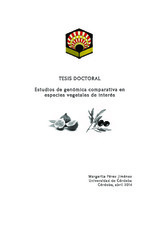Estudios de genòmica comparativa en especies vegetales de interés

View/
Author
Pérez Jiménez, Margarita
Director/es
Dorado, G.Hernández Molina, Pilar
Publisher
Universidad de Córdoba, Servicio de PublicacionesDate
2014Subject
Marcadores microsatélitesAgroalimentación
Genómica comparativa
Polimorfismos de un solo nucleótido
SNP (Single Nucleotide Polymorfisms
Higuera
Olivo
METS:
Mostrar el registro METSPREMIS:
Mostrar el registro PREMISMetadata
Show full item recordAbstract
Los microsatélites son marcadores moleculares ampliamente
utilizados en estudios de biodiversidad, siendo particularmente
útiles en la identificación varietal. Otra de las aplicaciones más
recientes de los microsatélites se halla en el campo de la
agroalimentación, siendo una herramienta útil en el desarrollo de
sistemas de trazabilidad y autentificación. La comparación de
secuencias y genomas (genómica comparativa) ha permitido
recientemente desarrollar nuevas herramientas como los
polimorfismos de un solo nucleótido (SNP; del inglés, “Single
Nucleotide Polymorphisms”) e inserciones/deleciones (del inglés,
“indels”), que completan la cobertura genómica de los microsatélites.
Los principales objetivos de esta tesis son el uso y evaluación de: i)
marcadores microsatélite basados en secuencias nucleares, como
herramientas en el estudio y caracterización de la agrodiversidad, en
especies olvidadas e infrautilizadas (cultivos prometedores), como la
higuera; y ii) marcadores microsatélite e inserciones/deleciones
basados en la comparación de genomas de cloroplastos de olivo,
para la identificación varietal y la aplicabilidad de ellos a la
trazabilidad de los aceites de oliva de distintas variedades. Los
resultados han demostrado que se trata de herramientas eficaces en
la caracterización de este germoplasma local, poniendo de
manifiesto la gran variabilidad que éste alberga. Todo ello ha
permitido identificar variedades de olivo, tanto a partir de hoja como
de aceite. Algunos de los haplotipos identificados pueden ser
empleados en la trazabilidad del aceite de oliva. Microsatellites are molecular markers widely used for biodiversity
studies, being particularly useful in varietal identification. A more
recent application of these markers is in the agrifood field, being a
suitable tool for the development of authentication and traceability
systems. Comparisons of sequences and genomes (comparative
genomics) have recently allowed the development of new tools, such
as single nucleotide polymorphisms (SNP) and insertions/deletions
(indels), which complete the genomic coverage of microsatellites.
The main goals of the present thesis are the use and evaluation of: i)
nuclear sequence-based microsatellite markers, as a tool for the
study and characterization of the agrodiversity in neglected and
underutilized species (promising crops), such as the fig tree; and ii)
microsatellite and indel markers, based on comparisons of genome
chloroplast of the olive tree, for varietal identification and their
application to the traceability of olive oils from different varieties.
Nuclear sequence-based microsatellite markers have been selected
to evaluate the germplasm agrodiversity in fig tree. The presence of
unique alleles has allowed the discrimination amongst local
populations. The results have demonstrated that these markers are
effective tools in the characterization of this local germplasm,
revealing a high level of variability. All this has allowed the
identification of olive tree varieties, both from the leaves and from
the olive oils. Some haplotypes could be used for olive-oil
traceability purposes.
